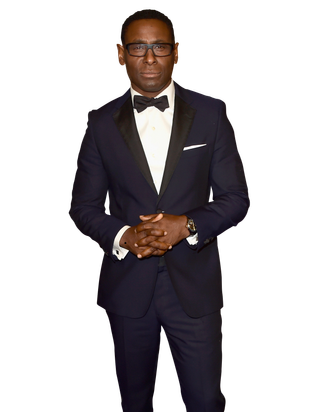
One of prime-time TVÔÇÖs most jaw-dropping moments happened last year on Supergirl when Hank Henshaw (David Harewood), the apparently xenophobic leader of the Department of Extranormal Operations (DEO), was revealed to be none other than JÔÇÖonn JÔÇÖonzz, also known as Martian Manhunter. Since then, Harewood, who previously played CIA honcho David Estes on Homeland, has quickly become a fan favorite. And he finds playing an extraterrestrial shape-shifter similar to his own experiences in Hollywood. ÔÇ£Coming from England to L.A., I was away from my friends and family,ÔÇØ he said. ÔÇ£Martian Manhunter lost his entire family with the destruction of his planet and has a loneliness and melancholy that I could relate to.ÔÇØ
TonightÔÇÖs episode of Supergirl promises to flesh out more of Martian ManhunterÔÇÖs backstory with the arrival of the White Martians. ÔÇ£JÔÇÖonn has to confront a being that was responsible for the destruction of his people,ÔÇØ Harewood explained. ÔÇ£We find out how he becomes ÔÇÿThe Last Son of Mars.ÔÇÖÔÇØ Vulture caught up with Harewood to talk about how he landed this plum role, the opportunities for black British actors in Hollywood, and the need for more diverse storytelling in British historical dramas.
How did you land the role of Hank Henshaw?
I was still in Los Angeles for pilot season. Selfie had been canceled, and I was getting ready to go back home when my manager suggested I hang around for a couple more weeks to see if any other opportunities came up. I was brought in to meet executive producers Greg Berlanti and Andrew Kreisberg. They sat me down and said they were shooting a pilot for Supergirl, and would I be interested? I read the script and loved it, although I still wasnÔÇÖt sure who Hank Henshaw was. When I did the screen test, I did it with both an American and British accent, and eventually they decided Hank was American.
How soon did you find out Hank Henshaw was really JÔÇÖonn JÔÇÖonzz/Martian Manhunter?
I found out after the pilot was picked up. Andrew called me into his office, gave me a pile of Martian Manhunter comics, and told me, ÔÇ£This is who youÔÇÖll be playing.ÔÇØ Martian Manhunter is such a great character with a rich mythology. And it was really helpful because before I was really struggling to get a handle on who Hank Henshaw was.
You are the sixth black actor to portray Martian Manhunter in the DC Universe in both the live and animated series. Watching your character on Supergirl I canÔÇÖt help but think about Ralph EllisonÔÇÖs protagonist in The Invisible Man ÔÇö he is everyone and no one. Do you think thereÔÇÖs a connection there?
I do know in the 1960s comics, Martian Manhunter took on the form of a black man ÔÇö that could have been influenced by the political climate back then. JÔÇÖonn Jonzz is this very powerful person who can wipe the floor with you but has to hide who he is from the world in order to blend in. I think itÔÇÖs a stroke of genius to make him black.
Last week, actor Idris Elba spoke before Parliament about the need for more diversity on British television and said that growing up, while his community was diverse, he did not see that reflected in the shows he watched as a child.
Even now the shows still show a lack of diversity. American television, for all its faults, still has a black presence in shows and even in commercials. YouÔÇÖll see black people in automobile ads, black women starring on their own television shows. We donÔÇÖt see that on British television. The reason being that the decisions are being made by white, middle-class men, and their shows cater to a certain demographic. This is why you see black British actors coming to America, because they know there are more opportunities. I didnÔÇÖt leave the U.K. because I wanted to be famous ÔÇö I came here to find work because I was struggling to find work as a black actor. WeÔÇÖve been banging around this issue for years. In the beginning we were laughed at, and now people are really paying attention.
ThereÔÇÖs been discussion of a black British invasion where some feel that actors like David Oyelowo and Chiwetel Ejiofor are taking away opportunities from their African-American counterparts. What are your thoughts on this critique?
Hollywood has always had a fascination with casting British actors in general, like Sir Laurence Olivier, Charlie Chaplin, Charles Laughton, and now itÔÇÖs back in vogue. I can certainly understand the frustration if people feel that way, but IÔÇÖm also finding a lot of great opportunities here and really enjoying these roles that I couldnÔÇÖt find in my own country.
The Guardian published an essay arguing that British historical dramas tend to ÔÇ£whitewashÔÇØ history and leave out people of color. Do you agree with the authorÔÇÖs point of view?
Without a doubt, the majority of historical period dramas tend to be told from a certain perspective. At least in America, black people have some visibility in period dramas, although itÔÇÖs usually in the form of slaves or servitude. I believe the U.S. is still years ahead in its depiction of African-Americans in history, in comparison to England, where they are constantly making historical dramas where black people donÔÇÖt even exist. WeÔÇÖve yet to deal with the uncomfortable history of England being involved in the transatlantic slave trade, whereas America has at least made some movies dealing with its racial history. It almost seems that black people didnÔÇÖt exist in England until after World War II, but there are stories of important people of color in 18th- and 19th-century England. This speaks to the fact that the majority of those films are made and produced mostly by Caucasians. What does seem to be happening rapidly is the awareness of this problem, as evidenced by the #OscarsSoWhite campaign. Hopefully, not far behind this awareness is concrete change.

